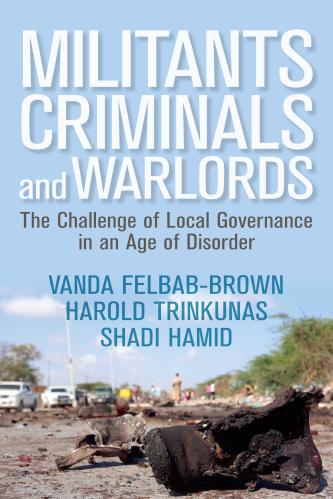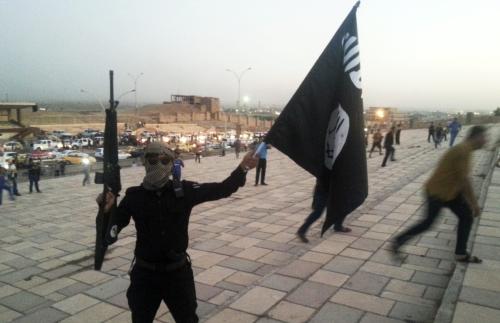Militant groups often engage in criminal operations, but they also seek to govern, write Shadi Hamid, Vanda Felbab-Brown, and Harold Trinkunas. These groups may be evil but they can also be rational, calculating, and sometimes surprisingly effective, outperforming existing governments. This post originally appeared in The Atlantic and has been adapted from the authors’ book “Militants, Criminals, and Warlords: The Challenge of Local Governance in an Age of Disorder.”
The Taliban claims to adhere to a strict interpretation of Islamic law, but that didn’t stop them from learning to love the poppy. The Islamic State developed an unforgiving set of laws to govern its caliphate, even as it engaged in widespread smuggling of antiquities and the synthetic drug Captagon. The Revolutionary Armed Forces of Colombia (the FARC) were once puritanically anti-drugs but turned wholeheartedly to supporting the cocaine economy following their Eighth Party Congress in 1982. This isn’t necessarily surprising. Despite initial protestations, militant groups often engage in criminal operations—drugs, trafficking, and smuggling—to fund their activities.
But crime is not their primary calling—they also seek to govern. These groups may be evil but they can also be rational, calculating, and sometimes surprisingly effective, outperforming existing governments. Yet this fundamental point is often lost on policymakers.
The Trump administration has made a lot of noise about defeating groups like the Islamic State, but it has said little about how to prevent them from reemerging in the future. In fairness, President Trump is only building on the “counterterrorism first” policy of his predecessor, President Obama. And the Trump administration’s hard line on illegal drugs coming from Mexico—setting aside the issue of the border wall—has echoes in that of previous Republican and Democratic administrations. But what if the true cause of instability isn’t terrorism or crime but the absence of effective governance?
How the Taliban and the Islamic State (and even some organized crime organizations) think about governance is shaped and, in some cases, driven by ideological and religious motivations. Latin America offers an intriguing contrast. There are, of course, violent actors in Latin America—quite a lot of them. Countries like Mexico have seen Middle East-like levels of violence. Some of the most brutal tactics of al-Qaida in Iraq in the 2000s, such as beheadings, were also used by Mexican drug cartels like Los Zetas. But tactics and the willingness to kill aside, much of the violence in Latin America is of a different kind, with religion and ideology playing a declining role.
In Latin America during the Cold War, Marxism was invoked by left-wing insurgents, as was nationalism by right-wing militias, in their attempts to seize control of the state. But with successful democratic transitions throughout the continent, states largely appropriated socialist demands by legalizing leftist parties and pushing a new brand of redistributive economics. The collapse of the Soviet Union and the moderation of socialist parties in countries made demands for a radically different political order seem unappealing (or unnecessary) to the vast majority of citizens.
Meanwhile, secularization and declining levels of religious observance throughout Latin America meant a receding political role for Catholicism. In Michoacán, Mexico, one exception has been the criminal group La Familia Michoacana, which has made extensive use of Christian imagery. In 2009, before the state fought back, the group reportedly had influence over (or extorted anyway) perhaps as many as 180,000 gas stations, truck shops, street markets, movie theaters, and businesses.
While some members of La Familia genuinely subscribed to the evangelically influenced, albeit distorted, religious practices, Christianity mainly functioned as a frame to justify their rule. References to a Christianity “purer” than that of the Catholic Church were meant to cement the group’s legitimacy with the local population. Christian ideology was also used to prevent defections to rival criminal groups or collaboration with state authorities by ensuring absolute obedience. La Familia also imposed certain mores of personal conduct—including, ironically, a ban on the use of drugs by cartel members.
In these cases, however, Christianity did not have much bearing on the content of governance. La Familia did not, for example, seek to impose any particular religious conduct on local populations. By contrast, in the case of the Islamic State, religion provided much more than mere justification; it informed the whole approach to governance, including an elaborate network of legal institutions.
In Latin America, the slow disappearance of genuine Marxist alternatives led elected leaders to deemphasize state coercion for resolving disputes or conducting politics. Unlike the Middle East, Latin America has experienced no interstate war since 1995, no international terrorist attacks since 1994, and no proliferation of weapons of mass destruction since 1945. There are no longer successful separatist or irredentist armed groups. No major political party based on religion has come close to having an electoral majority in the last two decades.
The Colombian peace process that began in 2010—featuring the once-avowedly Marxist FARC—reflects the general trend toward addressing ideological differences within state institutions that began with the democratic transitions of the 1970s and 1980s. The decline of religious politics coupled with the integration of socialist ideology into mainstream politics has had major implications for violent conflict: Today, armed groups have virtually no alternative popular ideologies upon which to credibly draw.
The closest substitute, which does not quite rise to the level of ideology in the traditional sense, is loyalty toward a gang, militia, or criminal organization, offering an alternative basis for social solidarity. For its part, the United States, since the end of the Cold War, has helped reduce ideological tensions by choosing not to intervene directly, by and large, in the region.
But even in the absence of clear ideological and religious motivations, some non-state actors still play important governance roles across Latin America. Where state presence is weak, this is inevitable. But even where states are not weak, governments may simply decide that the cost of establishing a state presence outweighs the benefits. Even wealthy countries like the United States, Germany, and France lack full control in pockets of territory—inner cities, refugee camps, migrant communities, or banlieues. Alienated minority communities may be reluctant to cooperate with authorities, increasing the cost of maintaining a state presence. But just because the state isn’t interested in providing governance doesn’t mean no one will.
Which leads us back to a basic theme: People seek out governance from whoever can deliver it, and if the state cannot, they’ll find somebody else to do the job. In the Middle East and Asia, religion and ideology matter, but, beyond making a concerted effort to understand how Islam influences politics, there’s little the United States can do to influence Islam’s evolution (it’s challenging enough for Muslim countries). What it can do is focus on the things it does know about and the things it can influence—and perhaps even change.
People seek out governance from whoever can deliver it, and if the state cannot, they’ll find somebody else to do the job.
To put it more simply, its governing ideology aside, the Islamic State would not have been able to govern large swathes of Syria and Iraq if there had been a legitimate, responsive state there already governing. Within the broad category of “governance,” there is a common thread that sticks out across regions, religions, and cultures: the demand for justice, even if it is of the “rough and ready” variety. Order and security are what residents demand most, at least at first. Even when local orders are brutal, they can offer the swift and predictable dispute resolution that populations seek.
In Afghanistan, conflicts over land and water and tribal feuds have escalated after the end of the Taliban regime as a result of weak institutional rule and power usurpation. The post-Taliban formal courts have not been able to stop or resolve such conflicts. Worse, the courts became corrupt and themselves a tool of land expropriation, something that worsened during the presidency of Hamid Karzai. The Taliban has moved to fill the gap by providing free mediation of tribal, criminal, and personal disputes. Afghans report a great degree of satisfaction with Taliban verdicts, unlike those of the official justice system, where petitioners often have to pay considerable bribes.
The Taliban’s code of conduct—the so-called Taliban La’iha—is designed both to maintain control of the Taliban rank-and-file and to limit the emergence of rogue elements. The Quetta Shura of the Taliban, one of its key leadership groups now based in Quetta, Pakistan, has even established teams to travel throughout Afghanistan and uncover complaints from local populations against the Taliban—about corruption, brutality, or other mistreatment. It has also distributed phone numbers throughout the country for reporting abuses. How much the local population trusts this reporting system and actually experiences any redress of grievances varies considerably, of course. In practice, the population is intimidated and abused by Taliban fighters and officials. Still, it says something that the Taliban feels it stands to gain from establishing and advertising such a system in the first place.
Similarly, the Islamic State went about building a distinctive legal order, allowing it to justify violence, regulate economic transactions, and reduce crime and corruption. In short order, with the international community paying little attention, it set up fairly elaborate institutional structures, oriented around interlocking sharia courts, binding fatwas, and detailed tax codes. This was what Yale University’s Andrew March and Mara Revkin term “scrupulous legality.” Distinguishing itself in governance terms was not particularly difficult, since the bar was so low; the other choices were the chaotic rule of other rebel groups consumed by infighting, the mass murder of the Assad regime, or the sectarianism of the Iraqi government and Shia militias.
In Latin America, various criminal groups maintain control of neighborhoods with a mix of coercion and public services, similar in many ways to the Taliban or the Islamic State, although not on the same scale. For example, in the favelas of Rio de Janeiro, criminal organizations such as Primeiro Comando da Capital regulate criminal activity with a so-called “criminal constitution,” which sets limits on what members can do to one another or even to the local population. Gangs also sponsor the development of public spaces such as plazas and sport facilities—they have even improved water delivery in one Rio favela. They help pay for the medical expenses of residents who run into trouble or provide small-scale loans to those who cannot make ends meet. Prison-based gangs, particularly in countries where they have achieved national influence such as Brazil and El Salvador, are also in the business of governance. They regulate and make predictable the otherwise brutal conditions in overcrowded jails.
Meanwhile, Mexico’s Sinaloa Cartel, long led by the notorious Joaquín “El Chapo” Guzmán, has provided handouts to local schools, clinics, and churches; built soccer stadiums; and sponsored fiestas. The cartel’s “governance,” including levying illegal taxes—extortion—was predictable and restrained compared to other criminal groups, at least prior to El Chapo’s extradition to the United States in 2017. During her fieldwork in Tijuana 2011 and 2013, one of the authors was repeatedly told by business operators that while all of the local criminal groups extort businesses, the Sinaloa Cartel’s taxes were by far the most tolerable.
Organized crime organizations sometimes even integrate into local civil society and politics. In Medellín, Colombia, local paramilitary organizations and gangs would join neighborhood civil society groups and serve on community boards. Social workers in Medellin reported that residents would turn to the dominant criminal organization to settle disputes or to deal with petty crime because local inhabitants prefer swift (if sometimes violent) resolution of problems over prolonged and uncertain interactions with the police and the courts. In Brazil, politicians seeking to be elected frequently need to bargain for permission to enter neighborhoods controlled by gangs or militias, which provides another avenue by which organized crime can shape politics and society.
Good governance—or even good enough governance—isn’t easy.
Whether in the Middle East, Latin America, or elsewhere, the question of how international actors can improve governance in places they don’t quite understand is always a difficult one. Good governance—or even good enough governance—isn’t easy. At times, it can seem like a stand-in for the heroically impossible, requiring Marshall Plan-style ambition, visionary leadership, and massive financial resources. But there is such thing as realistic governance goals—realistic in that they might require billions of dollars, a modest amount for the United States, but more importantly political will along with feasible timelines. Most of all, though, they require a change of attitude.
The difficult, often tragic experiences of the United States and the international community in Iraq and Afghanistan have produced resignation and exhaustion. Far from wanting to promote state-building and good governance, many officials call for a hands-off approach beyond the occasional remote killing of terrorists. Or, if a military intervention is in fact necessary, they call for handing over the responsibilities of governance to local powerbrokers as quickly as possible. Yet this is exactly why such limited interventions produce such limited, disappointing, and even disastrous results. And this is why armed nonstate actors remain a persistent threat—not simply because they are violent or because not enough of them are killed, but because they provide public goods as well as public bads.
As Kenneth Pollack writes, emphasizing counterterrorism “as a goal of foreign policy” is a mistake. Terrorism, after all, is a product of other things, and those other things—whatever we think they may be—must be addressed. To put it differently, you cannot fight terrorism just by fighting terrorism. Acknowledging as much would be a good, and overdue, first step.










Commentary
When terrorists and criminals govern better than governments
April 5, 2018